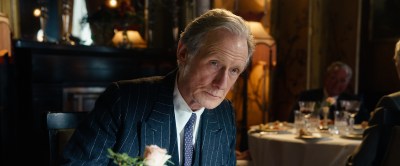Two recent films that couldn’t be more different arrive at the same place. In both, men near the ends of their careers are determined to do the work necessary to leave behind something of importance. They prove that being a beautiful person is not age-related!

Living is a feature film, with a screenplay by Kazuo Ishiguro, directed by Oliver Hermanus (trailer). Rodney Williams, London bureaucrat in a do-nothing department, is portrayed by Bill Nighy. If you’re a Nighy fan like me, that’s all you need to know to want to see this film, but there are plenty of other reasons to do so. Given a fatal diagnosis, Williams is inspired to do something with his life, to leave behind something meaningful.
The film is more charming than sad, and pretty frustrating with its apt demonstration of how resistant to change bureaucracies are! Even so, it’s possible to make a positive difference in at least some people’s lives. Watch for the dinner scene in which Williams’s daughter-in-law desperately tries to signal her husband to confront his father about what she considers his questionable behavior.
The story closely follows that of a 1952 Japanese film, Ikuru, and you can see how its emphasis on conformity would work well in that culture.
Rotten Tomatoes critics’ rating: 96%; audiences 86%.

Turn Every Page is a documentary that any historian or author or editor is bound to love (trailer). Subtitled The Adventures of Robert Caro and Robert Gottlieb, it tells the story of the half-century of collaboration between author Robert Caro—The Power Broker(now in its 17th printing) and the LBJ biographies, starting with The Path to Power—and his renowned editor, Robert Gottlieb. They were young men when they started; they’re elderly now, and this film about them is fascinating from beginning to end.
The film was made by Gottlieb’s daughter, Lizzie, and she never puts a foot wrong. She brings in other voices, she takes a trip to Texas, she uses maps of New York City to show how Robert Moses’s massive public works projects shaped New York, and when she showed some of the famous books Gottlieb has edited, I sat there saying, “I read that. Read that. Yep. Another one.” In a classroom discussion of The Power Broker, a teacher says we can’t know whether New York would be a better place without Moses’s projects, but it definitely would be a different place.
After dwelling on Moses’s kind of power, Caro undertook a study of political power at the national level and chose Lyndon Baines Johnson as his exemplar. Because when doing his research he “turns every page,” he uncovered information about this period that was previously unknown, about which lesser writers might say, “We’ll never know whether . . .” Now, for better or worse, we do.
Caro takes a novelist’s interest in the impact the exercise of power had on people—from those in the way of one of Moses’s new expressways to the people who supported Johnson’s political wheeling and dealing. In one of the documentary’s more amusing moments, he and Gottlieb, preparing for a grueling day of editing, must scour the Knopf offices to come up with—a pencil.Rotten Tomatoes critics’ rating: 96%; audiences 100%!









